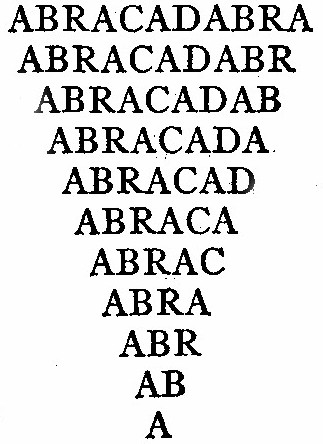I conjure thee,
O Athame[a]The Athame is a ritual dagger.
By these names, Abrahach, Abrach, Abracadabra
That thou servest me for a strength and
defence in all magical operations
against all mine enemies, visible and invisible …[1]

Wikimedia Commons
Abracadabra is a magic wordVerbal charm to be spoken or chanted, sometimes a single magic word such as Abracadabra or the Renervate encountered in the fictional Harry Potter series of books. that has been in use since at least the second century BCE, when it appears on a Greek amulet as a ba ga da.[1] The occultist Aleister Crowley suggested in his The Book of the Law (1904) that the correct form of the word is abrahadabra, largely for numerologicalModern successor to arithmomancy, embodying the belief that numbers can explain the workings of the universe and thus allow predictions to be made. reasons.[2]
Various hypotheses have been proposed for the etymology of abracadbra, but all lack supporting evidence. They include an alteration of the Latin abecedarius, and a connection with the Hellenistic Greek Ἀβράξας (abraxas). Others suggest that the word is derived from an unknown Aramaic name of a demon.[3]
In his 2nd-century Liber Medicinalis, Quintus Serenus Sammonicus advocates wearing an amulet containing the word for the treatment of double tertian fever, known today as malaria. The spell was widely invoked during the Great Plague of London (1665–1666), when residents nailed it to their doors to ward off the disease,[1] a practice which Daniel Defoe was particularly dismissive of in his A Journal of the Plague Year.[4]
Notes
| a | The Athame is a ritual dagger. |
|---|
